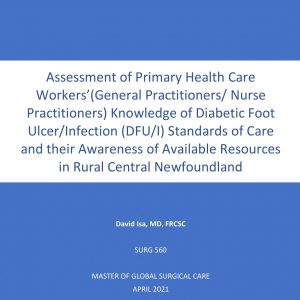 David Isa, a student of the MGSC program, recently published their SURG 560 final report to UBC cIRcle. This report is a summary of the final practicum project “Assessment of Primary HCWs (GPs/NPs) knowledge of DFU/I standards of care and their awareness of available resources in rural Central Newfoundland” conducted Jan 2021 – Feb 2021.
David Isa, a student of the MGSC program, recently published their SURG 560 final report to UBC cIRcle. This report is a summary of the final practicum project “Assessment of Primary HCWs (GPs/NPs) knowledge of DFU/I standards of care and their awareness of available resources in rural Central Newfoundland” conducted Jan 2021 – Feb 2021.
To read the full text, please visit here.
Background: Diabetic Foot Ulcer/Infection (DFU/I) is a challenging condition to manage and to live with for patients and the healthcare system. This is even more so in a rural setting such as Central Newfoundland as this condition requires a multidisciplinary approach. Primary healthcare workers (HCWs), family doctors and nurse practitioners, are usually the first point of contact with the healthcare system for patients with DFU/I. For optimal care to be delivered, these primary HCWs must have good knowledge of the condition and be well aware of what resources are available to them in their rural locale to provide optimal care. This study aims to determine if a knowledge gap exists among primary HCWs in rural Central Newfoundland, to quantify this gap if it exists, and to determine how aware they are of available local resources to help with DFU/I care.
Study Overview: A 57-question survey was mailed out to all 117 primary HCWs in the Central Health region of Newfoundland to assess their knowledge on DFU/I prevention, its management, and their awareness of available resources in the region. The results showed that primary HCWs have a high knowledge of DFU/I prevention and a high awareness of available resources. The results also showed that their knowledge on DFU/I management is just about optimal and there is considerable room for improvement here. Available resources in Central Newfoundland and how primary HCWs could access them for their patients is described in this paper and suggested practice recommendations are given in order to improve DFU/I management by primary HCWs for improved patient outcomes.
